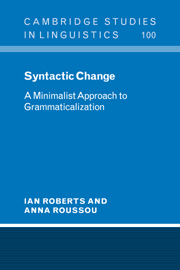2 - T elements
Published online by Cambridge University Press: 22 September 2009
Summary
Introduction
The purpose of this chapter is to provide empirical evidence for the claim that grammaticalization involves reanalysis of functional categories. The central idea is that whenever grammaticalization takes place, the content of at least one functional category is reanalysed, in such a way that new morphophonological realizations of functional features are created. In the notation of Chapter 1, section 1.3, new cases of F* develop for some feature F (usually, but not always, F*Merge is innovated – see below and Chapters 3 and 4 for empirical evidence). This can mean that a lexical item or class of lexical items is reanalysed as functional, or that one functional category develops into another. We will see cases of both kinds in what follows. Crucially, our approach to grammaticalization implies that it is not a structural change: functional structure is present both before and after grammaticalization takes place; what changes is the way the features associated with functional heads are realized. More precisely, assuming a universal hierarchy of functional heads, as mentioned in Chapter 1, section 1.2 (see also Cinque 1999), the change involves the overt realization of these heads.
The chapter is organised as follows: section 2.1 deals with the grammaticalization of V elements to T markers, focussing on the development of modals in the history of English. This has been treated as a typical case of grammaticalization whereby a lexical verb is reanalysed to an auxiliary element.
- Type
- Chapter
- Information
- Syntactic ChangeA Minimalist Approach to Grammaticalization, pp. 35 - 72Publisher: Cambridge University PressPrint publication year: 2003



